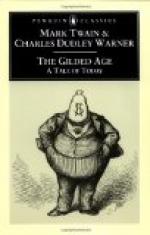Alas! Mr. Bolton’s affairs could not wait for “indications.” The future might have a great deal in store, but the present was black and hopeless. It was doubtful if any sacrifice could save him from ruin. Yet sacrifice he must make, and that instantly, in the hope of saving something from the wreck of his fortune.
His lovely country home must go. That would bring the most ready money. The house that he had built with loving thought for each one of his family, as he planned its luxurious apartments and adorned it; the grounds that he had laid out, with so much delight in following the tastes of his wife, with whom the country, the cultivation of rare trees and flowers, the care of garden and lawn and conservatories were a passion almost; this home, which he had hoped his children would enjoy long after he had done with it, must go.
The family bore the sacrifice better than he did. They declared in fact —women are such hypocrites—that they quite enjoyed the city (it was in August) after living so long in the country, that it was a thousand tunes more convenient in every respect; Mrs. Bolton said it was a relief from the worry of a large establishment, and Ruth reminded her father that she should have had to come to town anyway before long.
Mr. Bolton was relieved, exactly as a water-logged ship is lightened by throwing overboard the most valuable portion of the cargo—but the leak was not stopped. Indeed his credit was injured instead of helped by the prudent step be had taken. It was regarded as a sure evidence of his embarrassment, and it was much more difficult for him to obtain help than if he had, instead of retrenching, launched into some new speculation.
Philip was greatly troubled, and exaggerated his own share in the bringing about of the calamity.
“You must not look at it so!” Mr. Bolton wrote him. “You have neither helped nor hindered—but you know you may help by and by. It would have all happened just so, if we had never begun to dig that hole. That is only a drop. Work away. I still have hope that something will occur to relieve me. At any rate we must not give up the mine, so long as we have any show.”
Alas! the relief did not come. New misfortunes came instead. When the extent of the Bigler swindle was disclosed there was no more hope that Mr. Bolton could extricate himself, and he had, as an honest man, no resource except to surrender all his property for the benefit of his creditors.
The Autumn came and found Philip working with diminished force but still with hope. He had again and again been encouraged by good “indications,” but he had again and again been disappointed. He could not go on much longer, and almost everybody except himself had thought it was useless to go on as long as he had been doing.
When the news came of Mr. Bolton’s failure, of course the work stopped. The men were discharged, the tools were housed, the hopeful noise of pickman and driver ceased, and the mining camp had that desolate and mournful aspect which always hovers over a frustrated enterprise.




